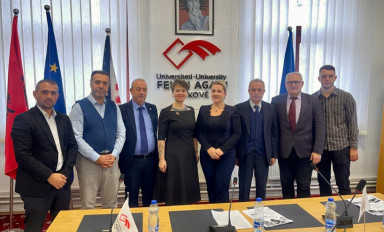Program: “Health Sciences in Sport and Tourism”
IN THE ACCREDITATION PROCESS
Upon successful completion of this program, the student will be able to:
- Explain the basic concepts of anatomy, physiology, biomechanics, and public health in the context of sport and health tourism.
- Recognize the impact of physical activity, nutrition, and lifestyle on promoting well-being and preventing diseases in various population groups.
- Assess the physical condition and functional capacities of individuals using appropriate measurement instruments and modern technologies.
- Implement individualized exercise and training programs for recreational, therapeutic, and sports performance purposes.
- Design and implement health and educational intervention plans through sport, physical activity, and health tourism.
- Understand and apply the principles of sustainable and responsible tourism, including aesthetic, recreational, reproductive, and medical tourism.
- Use knowledge in management, strategic planning, and health economics to develop and manage sports, rehabilitation, and tourism centers.
- Apply interdisciplinary knowledge and skills in orthopedics, traumatology, hydrotherapy, and balneology for rehabilitation and functional recovery purposes.
- Demonstrate skills in using information and communication technologies for educational, promotional, and research purposes in the field of sport and tourism.
- Design and implement basic research and applied projects using research methodology and fundamental statistical analysis.
- Communicate effectively with diverse groups, demonstrating professional interaction and cultural sensitivity in providing personalized services.
- Act in accordance with ethical and legal professional standards, respecting clients’ and patients’ rights in health and tourism contexts.
- Work independently and collaboratively, taking responsibility for professional actions and demonstrating decision-making skills in real work situations.
The learning outcomes of this program are structured progressively and interrelatedly, beginning with scientific foundations, developing applied competencies, and culminating in professional practice and critical reflection.
The “Health Sciences in Sport and Tourism” (BSc, 180 ECTS) program and its learning outcomes are based on labor market needs and the strategic documents of the Republic of Kosovo, such as the Sectoral Health Strategy 2025–2030, the Tourism Strategy 2024/2030, and the State Sports Strategy 2025–2030. The general and specific objectives of these strategies are directly linked to the learning outcomes of this program.
Alignment with the Sectoral Health Strategy 2025–2030
- Strengthening primary healthcare and promoting public health;
- Community health and well-being;
- Global health and non-communicable diseases;
- Digital skills and quality management.
Alignment with the Tourism Strategy 2024/2030
- Enhancing human capacities and expanding the tourism offer according to sustainability standards and competitiveness;
- Developing high-quality and sustainable marketing and infrastructure for tourism;
- Regulatory policies and legislative framework;
- Goals for increasing tourism and ensuring the health and safety of tourists.
Alignment with the State Sports Strategy 2025–2030
- Sport as a factor for health, well-being, and human capacity development;
- Increasing participation and physical activity across the population through quality sports infrastructure and strategic investments;
- High performance in competitive sports and international recognition;
- Improving governance, transparency, and legality in sports.
Thus, the program follows the model of foundational knowledge, applied skills, practice, and critical reflection, ensuring comprehensive and coherent preparation for the labor market and further studies.
Year 1
- Acquisition of fundamental knowledge in anatomy, physiology, hygiene, and the basics of tourism.
- Development of academic and research skills to establish a scientific and methodological foundation.
Year 2
- Expansion of knowledge toward applied competencies (muscle conditioning, communication in sport and tourism).
- Integration of global perspectives (reproductive tourism, air quality management, digital skills).
- Linking theoretical knowledge with practical skills in health, fitness, and tourism.
Year 3
- Orientation toward professional practice (functional training, first aid, global health, professional practice).
- Application of acquired knowledge in real contexts. Integration of interdisciplinary competencies in health, sport, and tourism.
Career Opportunities
Graduates of this program can work in various institutions such as non-governmental and governmental organizations focused on tourism, sport, and recreation (e.g., MINT, MSH, MASHTI, MKRS) or private institutions (e.g., mountaineering associations, Kosovohiking); patient support agencies for health/esthetic services; tourism and recreation agencies promoting public well-being; rehabilitation and spa centers; public health projects; fitness and sports clubs; and as professional consultants in health, sport, and tourism.
They may also work in the Ministry of Industry, Entrepreneurship, and Trade, which includes the Department of Tourism. Moreover, graduates are expected to develop entrepreneurial skills, enabling them to create innovative self-employment opportunities and sustainable practices, ensuring strong preparation for the labor market.
The University “Fehmi Agani” in Gjakova has cooperation agreements with most of the institutions mentioned above, where students from other programs complete their professional internships, including students of this program.

 Library
Library .jpg)


.png)
